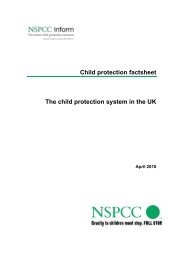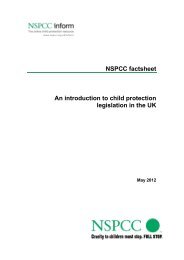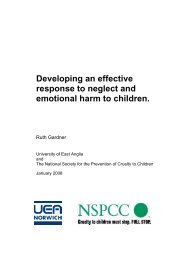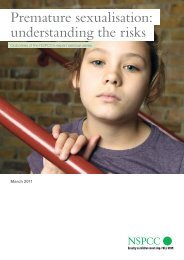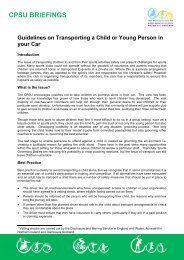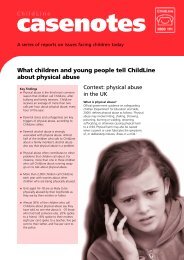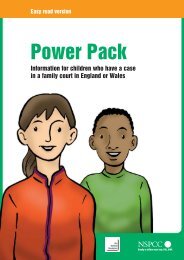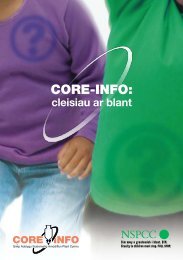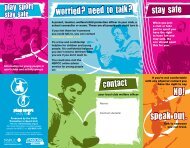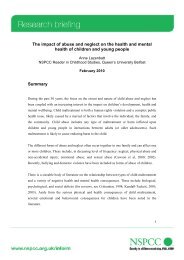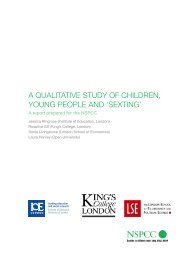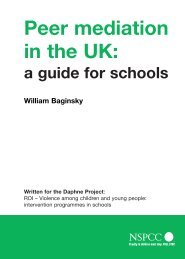Neglect and serious case reviews (PDF, 735KB) - nspcc
Neglect and serious case reviews (PDF, 735KB) - nspcc
Neglect and serious case reviews (PDF, 735KB) - nspcc
Create successful ePaper yourself
Turn your PDF publications into a flip-book with our unique Google optimized e-Paper software.
maintaining a healthy, safe relationship<br />
Executive Summary<br />
Parents can wittingly <strong>and</strong> unwittingly be a source of danger rather than comfort to their<br />
child. Practitioners can miss the life-threatening risks that arise when relationships are<br />
so poor that care, nurture <strong>and</strong> supervision are almost non-existent. While every effort<br />
should be made to intervene early to prevent a parent–child relationship deteriorating in<br />
this way, once this has happened urgent action needs to be taken. Action is stalled when<br />
this danger is hidden, <strong>and</strong> when children, adolescents <strong>and</strong> families disappear from view.<br />
Practitioners need to be sensitively attuned to the relationship between parents <strong>and</strong><br />
children, even where parents present as loving but may be failing to cope, for example<br />
with the dem<strong>and</strong>s of their child’s complex health needs or disability.<br />
Older children carry the legacy of their experiences of neglect <strong>and</strong> rejection with them.<br />
As a consequence, threats to their own life can come from their own high-risk behaviour<br />
or from suicide. Adolescents need to maintain, or be helped to build, safe, healthy<br />
relationships with their peers <strong>and</strong> with caring adults.<br />
Messages for policy makers, decision makers, practitioners <strong>and</strong> managers<br />
• Routine contact between parents <strong>and</strong> professionals should be an opportunity to<br />
promote sensitive <strong>and</strong> attuned parenting. Early concerns should prompt targeted<br />
help from Children’s Centres, enhanced health visitor contact like the Nurse Family<br />
Partnerships, <strong>and</strong> other school or community-based help or services for example from<br />
Child <strong>and</strong> Adolescent Mental Health Services (CAMHS).<br />
• To underst<strong>and</strong> parent–child relationships better, practitioners should ask themselves:<br />
What does this child mean to the parent <strong>and</strong> what does the parent mean to the child?<br />
Reflective supervision helps practitioners to underst<strong>and</strong> complex relationships <strong>and</strong><br />
should support them to act decisively in the unusual <strong>case</strong>s when children are in danger.<br />
• Missed appointments should be followed up <strong>and</strong> not considered a reason to withdraw<br />
a service. Children <strong>and</strong> young people who disappear from view may be at risk of<br />
severe or life-threatening harm from neglect. To be safe, children need to be seen <strong>and</strong><br />
importantly, to be known.<br />
The fact that neglect is not only harmful but can also be fatal should be part of a<br />
practitioner’s mindset as it would be with other kinds of maltreatment. Practitioners<br />
<strong>and</strong> managers should recognize how easily the harm that can come from neglect can be<br />
minimized, downgraded or allowed to drift. Practitioners should deal with neglect <strong>case</strong>s<br />
in a confident, systematic <strong>and</strong> compassionate manner.<br />
15




